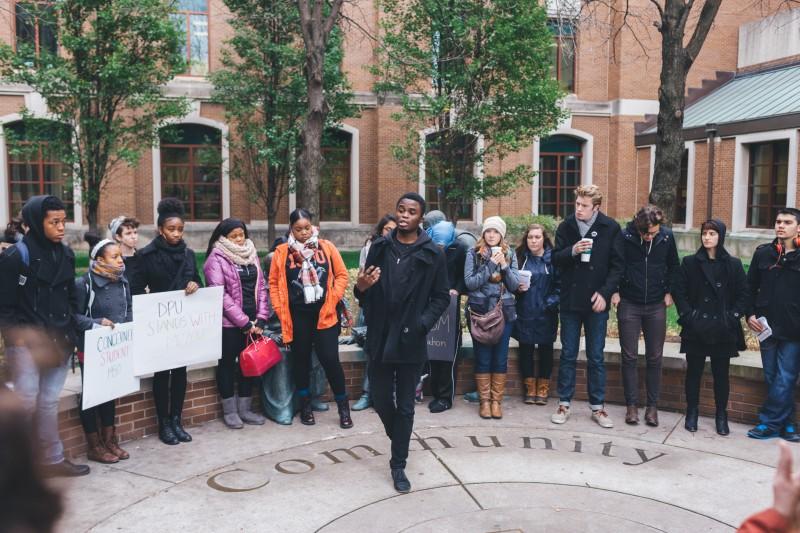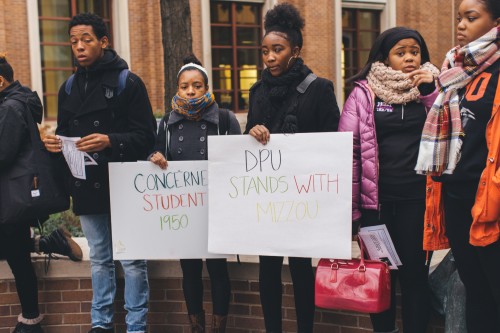
Black college students around the country responded to a call for solidarity this week after the president of the University of Missouri (Mizzou) stepped down in response to student-led protests against racial harassment on campus. But the gathering at DePaul unleashed tensions within the community that demonstrated a need for support and continued discussion of racism both around the country and on DePaul’s own campus.
“I didn’t know what to expect, but I’m not going to say that I did not expect a lot of people to be emotional,” Elijah Obasanya, president of Men of Vision and Empowerment (MOVE), said during the heated conversations after the event.
About 200 people filled St. Vincent’s Circle on DePaul’s Lincoln Park campus for MOVE’s event Thursday, which was advertised through Facebook to “stand with (Mizzou’s Black Collegiate) in eradicating racism and racial inequality in higher education.”
But after Obasanya’s introduction and the passionate calls to action by former MOVE president Ed Ward and University Minister Pastor Keith Baltimore, a few students expressed anger and frustration at racial inequality on campus.
A DePaul student whose name could not be confirmed called out and said he had been racially profiled at DePaul. He complained that counseling services specifically for African-American students weren’t available. The atmosphere grew tense as Baltimore tried regaining control of the gathering and more students began calling out, asking others to respect those in the center of the circle.
Confusion ensued until a student from the outer rim of the circle stepped forward and emotionally called for students to put their personal issues aside and come together to realize the meaning of the event, which was about black student solidarity and moving forward against racism in higher education.
Despite the fierce wind whipping against the crowd, the event spanned more than an hour, lasting until 4:30 p.m. By then Baltimore regained control of the gathering, thanked everyone for coming and announced that discussions could continue in the circle. Clusters of students —some yelling, others watching — lingered for another 30 minutes.
Obasanya mingled among them.
“I think people being emotional was a natural response to this situation. Anger, sadness, a mixture of both, anxiety — all of that is a result of what has happened,” Obasanya said.
Months of racial tension on Mizzou’s campus came to a climax last week when black players on the school’s Division I football team refused to play and brought national attention to the campus.
Student protests were led by a group called Concerned Student 1950, which included a student on an 8-day hunger strike. In response to racial harassment — in particular during the homecoming parade rehearsal and a swastika that had been drawn in feces in a dorm — black students appealed to the university president during the homecoming parade for a response and acknowledgement. The president’s inaction was the final straw.
A camp of hundreds of protesters in the quad and national media attention led to president Tim Wolfe and chancellor R. Bowen Loftin stepping down from their positions on Nov. 9, but threats to black students continued over a media outlet called Yik Yak and rumors of a Klu Klux Klan presence spread through campus.
“Our people at Missouri are afraid to go to class,” Ward said at the DePaul solidarity gathering. “It should not be considered an act of wisdom to make the decision not to go to class if you fear for your life. So what are we doing by saying we stand in solidarity and yet they still cannot go to class? Let us stand up to make sure they get the education at an institution they paid to go to. They have a legal right, they have a legal authority, they have an obligation to attend that university, and we have an obligation to stand in solidarity with them. We have an obligation to move with them.”
Sophomore Marcella Ramirez said it was important for all students of color to stand together and that “it’s not okay that people of color are suffering, in 2015, in college.”
But despite students’ agreement on this issue, factions developed within the crowd.
Suzette Brito, member of the Latina sorority Lamba Theta Alpha, said she appreciated having the solidarity event, but sympathized with its organizers.
“People just started going at each other about issues that aren’t relevant. This was supposed to be for everyone to come in solidarity to talk about issues and respect the open space that was given,” Brito said. “This should be about love, not about hate. If we’re all people of color, we should come to a conclusion and love each other and come in solidarity because essentially we’re all going through some type of oppression.”

Among the disagreement in the talks after the event, freshman Whytne Stevens said that conflict between people fighting for a cause is inevitable.
“I think it’s natural. It’s going to happen. It may make you feel uncomfortable, (but) I think people should see it as part of the natural process,” Stevens said. “How do we as a community at DePaul, as black students at DePaul, deal with this issue? I’m sure most people at DePaul have dealt with some kind of racial profiling, discrimination. I personally can’t say that yet, I’m a first year student. I think people are just very emotional right now, which fuels into the division that people saw. I think it’s just natural.”
“I think a lot of legitimate anger was expressed,” Ward said. “And the reason it’s legitimate is because a lot of things that happen across the country causes black people in this country to be upset, and rightfully so. It’s righteous anger, out of love.”
Obasanya said that many students felt overcome by their emotions because they may not have a legitimate space to express their frustration with ongoing struggles against racism.
“A lot of people may not have good friends of color who can support them and relate, so they might have been forced to deal with this on their own,” Obasanya said. “I’m glad we were able to have that space for them because clearly there are a lot of people dealing with a lot of anxiety, sadness, anger and all of the above.”
Freshman Zeph Kaffey said that she agreed with the student who yelled out that there should be more counseling services offered to black students on campus. Kaffey said that DePaul could send emails to students after traumatic events, listing the services available to help them.
“Sometimes I feel like I shouldn’t reach out to my school to give me a service that I should have, the service that I know a white person in my position (would have in case of an emergency),” Kaffey said. “But that I’m hurting and I have to reach out outside of my comfort zone, I feel like that shouldn’t happen at my university.”
Ward agreed and said DePaul can do more to provide some services to black students.
“Sometimes you have to just show us what those programs are instead of us having to go and search for those programs,” Ward said. “Now, I’m not suggesting that those programs are not here. But if they are, we should know where they are without having to go above and beyond to find them.”
In the midst of the talks and frustrations expressed by some of the students, Baltimore said that every university still had progress to make.
“I can tell you officially and for sure that the black students here at DePaul are not alone. Is this community perfect? Nope… But I can guarantee you that if you want it — and you’re a person of color, (or) you’re a black person and you need help or support — there is someone or something at DePaul for you to start the conversation,” Baltimore said.
Perhaps it was with that same idea in mind that Vice President of Student Affairs Eugene Zdziarski decided to attend the event.
“For me, this was about coming here to listen to student concerns and hear what some of the issues are and to see and make sure we continue to do the things that we can to address our student’s needs,” Zdziarski said.
Baltimore called upon students to make a change in their lives, big or small, to further the movement towards racial equality. For Obasanya, part of this means continuing the conversations started at the event.
“This is the most energetic of the meetings we’ve had. I love that because clearly there is a lot of energy that has to be released,” Obasanya said.
“There are a lot of emotions that people are dealing with on their own and we saw that emotion today. Going forward I think we need to support them,” Obasanya said. That means creating spaces that center around similar issues and allowing people to express emotion that “gets pent up.”
Obasanya said he also wants to partner with other organizations on Chicago campuses to develop a unified approach to battle racism in higher education.
“A lot of times, if you’re a minority at an institution, you kind of feel as though you are alone in what you’re going through, but I think that as black students we need to realize that a lot of things that go on at Mizzou or UIC or Loyola happens or connects to what goes on here,” Obasanya said. “New precedents are being set every day, culture is being set every day. We have to be able to create the future that we want to see, and to be able to do that, there needs to be a clear goal going forward. I think that comes from organizing. This was essentially Mizzou calling out black collegians to show support and solidarity with them and I’m glad we did that. Going forward we need to have a system and structure in place in case something like this arises.”

